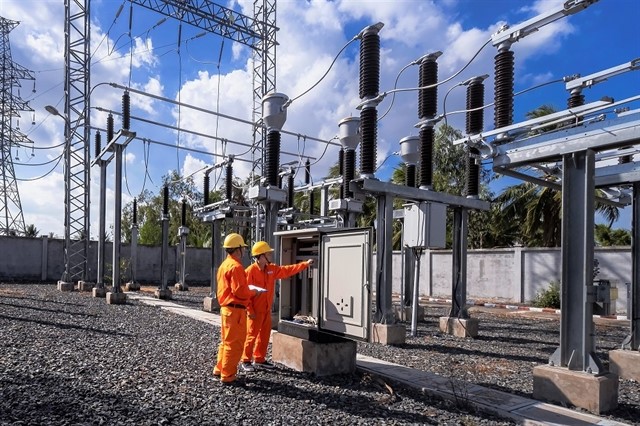In the event Vietnam Electricity (EVN) and investors fail to produce a consensus, the prices will be determined by the Ministry of Industry and Trade with consideration given to fair competition for other sources of electricity.

There have been difficulties in negotiating power purchase agreements (PPA) between Vietnam Electricity (EVN) and investors of LNG power projects, according to EVN.
A major hurdle was a demand by investors for EVN to commit to long-term purchases of the majority of electricity generated, between 72-90 per cent of the project's capacity. From the investors' perspective, long-term commitments by the EVN help reduce investors' financial risk and gain better leverage with LNG suppliers, which, in turn, help Việt Nam secure a sufficient supply of LNG, at better prices.
However, EVN said the amount of electricity purchased will strictly reflect the negotiations between the group, Việt Nam's sole power distributor, and the investors. In the event they fail to produce a consensus, the prices will be determined by the Ministry of Industry and Trade (MoIT) with consideration given to fair competition for other sources of electricity.
According to EVN, LNG power has remained an expensive product as the cost of imported LNG was reported at US$12-14/1 million BTU, driving its cost to VNĐ2,400-2,800/kWh, significantly higher than other sources of electricity available on the market.
In addition, according to the country's Power Plan VIII, by 2030 Việt Nam's total LNG production will amount to 15 per cent of total power production. Long-term commitments to an expensive product may severely undermine the group's purchasing power and consequently, its retail prices.
In a recent report EVN said: "By agreeing to long-term purchases of costly LNG electricity, the group may have to put itself at financial risk while creating an unfair playground for other suppliers, which have only signed annual supply contracts with the EVN until now. It is also contradictory to the country's development direction for the power market, which aims to reduce long-term contracts in favour of suppliers who can deliver faster."
However, the group stressed the importance of bringing online all LNG power projects by 2030 as failure to do so can hinder the ability to secure supply, creating a supply-demand gap as large as 3 billion kWh a year after 2030. EVN's current proposal to the investors was 65 per cent, which according to the group has taken into consideration their rights and interests.
Another request by the investors was to use third-party PPA regulations as standards (e.g. the UK's PPA Laws) to settle legal disputes, which the group has so far firmly rejected, saying Việt Nam's investment laws and judicial system should be the only applicable standards.
Answering another request by the investors regarding the conversion of revenue generated in VNĐ to foreign currencies, EVN said it was only considered as a precedent in old BOT projects not as a part of PPA negotiation, and more importantly not up to the group to decide.
EVN has submitted a proposal to the Prime Minister with solutions to help speed up the negotiation process with the investors, ensuring LNG projects' progress, and balancing the investors' interests as well as those of the group.
It said so far the group had started negotiations with the Nhơn Trạch 3, Nhơn Trạch 4, Hiệp Phước and Bạc Liêu LNG projects.
In a recent development, the MoIT revealed that it had started a process to review and study EVN's PPA for LNG projects. The ministry said the Government had agreed in principle to bring the amount purchased under long-term contracts to above 70 per cent starting from 2030 during the projects' payback period but not longer than seven years.
According to the ministry, regarding the mechanism for the LNG-importing gas power plant project, organisations and individuals participating in the investment of LNG-powered power plant projects must proactively implement projects as outlined in the Power Development Plan following regulations, ensuring effectiveness, to unify the negotiation, signing, and responsibility for contracts and commercial agreements.
For the mechanism for natural gas-powered domestic power plants, for key projects in the petroleum sector contributing significantly to economic development, ensuring national energy security, national defence, and protecting Việt Nam's sovereignty, the Government agrees in principle to transfer the gas price conversion mechanism to electricity prices for power plants and the MoIT will guide the mechanism for consuming the output of gas from the offshore gas fields of Blue Whale and Lot B. — VNS





